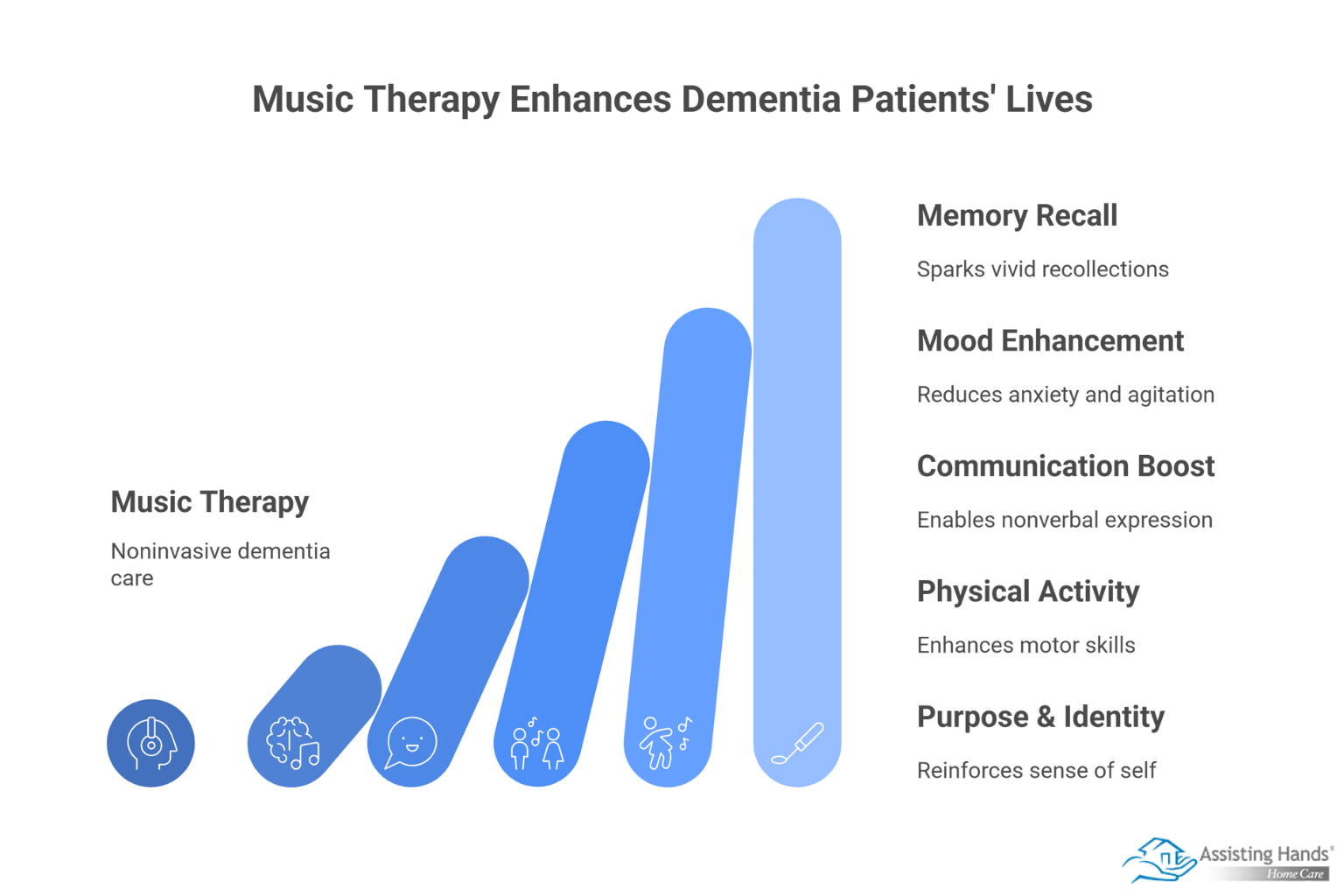
Table of Content
Music has a unique way of connecting with the human brain. For individuals living with dementia, it can open doors to memories, emotions, and connections that seem otherwise out of reach. Music therapy is increasingly used as a noninvasive and effective tool to enhance wellbeing and quality of life for dementia patients. Here’s a look at the remarkable benefits it offers.
Stimulates Memory Recall
Music has the powerful ability to tap into long-term memory. Even as dementia progresses and short-term memory fades, people often retain the ability to remember songs and melodies from their earlier years. Familiar music can spark vivid recollections, helping dementia patients recall moments from their past.
For example, your loved one may hear a particular song and suddenly remember childhood events or life milestones like weddings or birthdays. This activation of memory not only brings comfort but also provides insights into your loved one’s life before dementia took hold.
Listening to music is just one of the many ways older adults can boost their wellbeing. Maintaining a high quality of life can be challenging for some seniors, but professional caregivers can help them attain this goal. Families can trust elder care experts to help their elderly loved ones focus on lifestyle choices that increase the chances of living longer and healthier lives.

Enhances Mood and Reduces Agitation
Dementia patients often experience mood swings, anxiety, and agitation due to the challenges of the condition. Music therapy can offer a calming and uplifting influence, stabilizing emotions. Listening to slow, soothing melodies can create a sense of tranquility, while upbeat tempos can generate feelings of joy and energy.
Additionally, engaging in music—whether through listening, singing, or rhythmic movements like clapping or tapping feet—releases endorphins. These “feel-good” hormones can elevate mood and counteract negative emotions, providing moments of respite from the confusion and frustration associated with dementia.
Boosts Communication and Social Interaction
One of the most heartbreaking aspects of dementia is the gradual loss of the ability to communicate verbally. Music can act as a bridge for nonverbal expression, enabling dementia patients to connect with others in meaningful ways. Singing together, for instance, fosters a sense of community and shared purpose.
Music also provides an avenue for self-expression. Your loved one might hum, clap, or sway to express emotions he or she has difficulty putting into words. Sessions of group music therapy allow dementia patients to interact with others, fostering social bonds that are vital for emotional wellbeing.
The type of elderly home care Richmond seniors need can vary. Some need assistance a few hours a day, while others require more extensive around-the-clock assistance. At Assisting Hands Home Care, we tailor our care plans based on each senior’s individual care needs, and the plans can be adjusted at any time. We are a trusted provider of respite and 24-hour care, and we also offer specialized Alzheimer’s, dementia, Parkinson’s, and stroke care for seniors.
Encourages Physical Activity and Coordination
Music can motivate physical activity in dementia patients, whether it’s tapping along to a beat, dancing, or playing a simple percussion instrument. These activities enhance motor skills and coordination, which are often affected by dementia.
For example, rhythmic movements to familiar beats can engage multiple areas in the brain, supporting neural connections associated with movement. Gentle dancing or stretching to music also promotes circulation and flexibility, benefiting overall physical health.
Provides a Sense of Purpose and Identity
Dementia often leads to feelings of disorientation and a loss of independence. Engaging in music therapy provides a sense of purpose. Activities like playing an instrument or singing favorite songs may remind your loved one of his or her abilities and individuality.
Music connected to personal history and preferences can also reinforce a sense of self. Seniors who loved playing the piano or listening to jazz may reconnect with positive aspects of their identities through these musical experiences. This sense of purpose plays an essential role in maintaining dignity and mental wellbeing.
Aging in place can present a few challenges for seniors living with dementia. However, they can still live independently at home with the help of professional dementia care. Richmond families can rely on Assisting Hands Home Care to provide their elderly loved ones with mental and social stimulation, timely medication reminders, assistance with meal prep, and much more. Our caregivers are available around the clock to help your loved one live a happier and healthier life. To learn about our high-quality in-home care plans, call us today.
